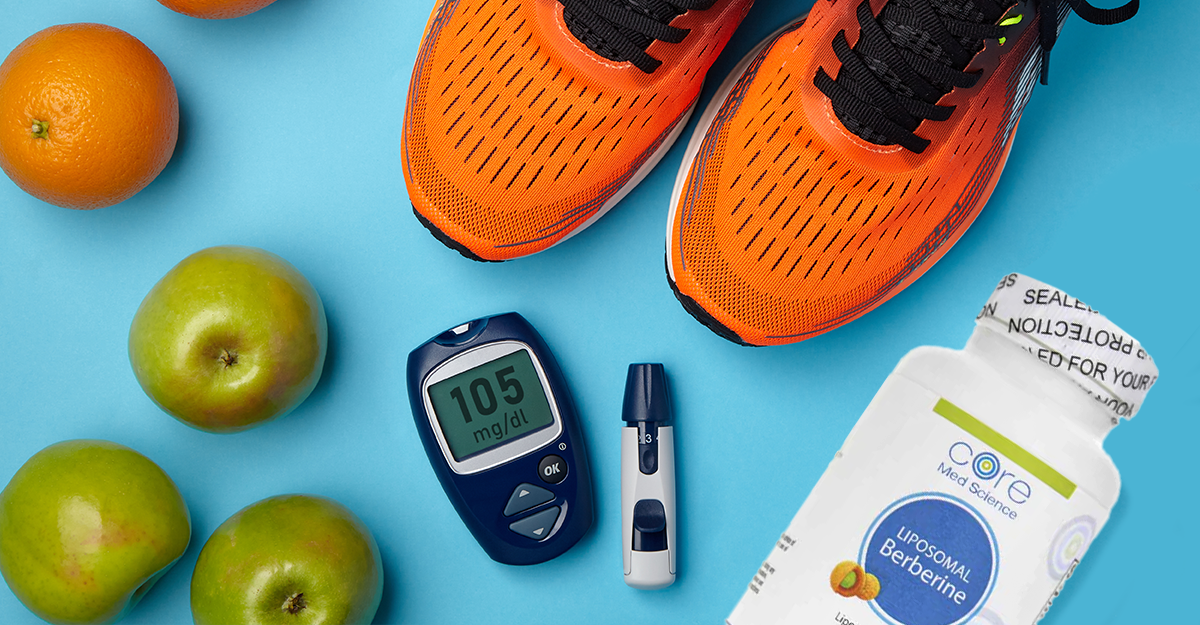
How to Overcome Insulin Resistance with Berberine
Insulin resistance is an underlying factor in chronic disease, driving metabolic syndrome, diabetes, cardiovascular disease, cancer, and more. From a functional medicine perspective, lifestyle and nutrition strategies are powerful in preventing, slowing, and even reversing insulin resistance. Berberine may help, too.
Berberine is a plant extract that benefits blood sugar balance and insulin resistance. Today’s article will explore how to overcome insulin resistance. We’ll cover:
- What is insulin resistance?
- How to use berberine for insulin resistance
- Berberine supplements
What is Insulin Resistance?
Insulin is a peptide hormone made by the pancreas. It plays many roles in the body, but its primary function is to help move glucose from the bloodstream into the cells, where it’s transformed into energy. Insulin works in a symphony with other hormones to maintain homeostasis. (Source 1)
Insulin resistance involves a loss of homeostasis, where the cells become resistant to insulin’s signals. Over time, blood glucose and insulin levels become elevated. A modern lifestyle and diet of processed, calorically dense foods are the primary drivers of insulin resistance across the population. (Source 1)
“Insulin resistance involves a loss of homeostasis, where the cells become resistant to insulin’s signals.”
Berberine and Insulin Resistance
Berberine is an alkaloid in many plants, such as Oregon grape root and barberry. Traditional Chinese medicine and Ayurvedic traditions have used berberine-rich herbs for thousands of years.
Modern research confirms ancient herbal practice, showing that berberine supplements activate the enzymes involved in glucose metabolism and mitochondrial function. Berberine improves glucose uptake by cells (meaning less insulin is required), balances blood glucose, and helps make cells more insulin-sensitive (the opposite of insulin resistance). (Source 2)
“Modern research confirms ancient herbal practice, showing that berberine supplements activate the enzymes involved in glucose metabolism and mitochondrial function.”
One study looked at 80 patients with metabolic syndrome, a collection of symptoms related to insulin resistance (elevated blood glucose, elevated blood pressure, elevated triglycerides, low HDL “good” cholesterol, and large waist circumference).
The study participants received the typical pharmaceutical treatment for metabolic syndrome or berberine. After four weeks, those taking berberine had:
- Lower blood glucose
- Lower markers of insulin resistance
- Better blood lipid profiles
- Lower markers of inflammation (Source 3)
Dozens of other studies have shown similar metabolic benefits. A meta-analysis of 46 berberine trials in people with type 2 diabetes compared berberine to placebo or standard diabetes therapies. The compiled data shows the following benefits of berberine:
- Lower fasting blood glucose
- Lower blood glucose after meals
- Lower body mass index (BMI)
- Lower insulin resistance markers
- Lower total cholesterol
- Lower LDL cholesterol (and higher HDL cholesterol)
- Lower inflammation (Source 4)
Not only is berberine highly effective for improving insulin resistance and related metabolic dysfunction, but it is also very safe at suggested dosages. (Source 4)
“Not only is berberine highly effective for improving insulin resistance and related metabolic dysfunction, but it is also very safe at suggested dosages.”
Studies also suggest that berberine could help manage symptoms of obesity such as aiding in weight loss and reducing BMI for people taking doses of more than 1 gram for day for more than two months, but the evidence is not conclusive. (Source 5)
Berberine Supplements
Berberine supplements are widely available and growing in popularity. The standard dose is 900 to 2000 mg daily. Dividing the dose into two or three daily doses and taking berberine with meals can help alleviate digestive discomfort possible with high doses. (Source 6)
Still, berberine has poor water solubility and is poorly absorbed, which can contribute to side effects. (Source 7)
Core Med Science Liposomal Berberine delivers high-quality berberine extract in a phospholipid liposome that mimics the body’s cell membrane. Core Med Science Liposomal Berberine contains 300 mg of berberine and 100 mg of alpha-lipoic acid per serving to support blood sugar and insulin homeostasis. This preparation allows for better absorption, fewer side effects, and significant benefits from lower dosages.
Core Med Science products are made in the U.S. and are GMP-compliant, vegetarian, GMO-free, and free of common allergens, including gluten and soy.
Since insulin resistance is largely lifestyle-related, solutions also involve nutrition and lifestyle change. For those who are already on the insulin resistance spectrum, berberine is a helpful, natural tool. With Core Med Science Liposomal Berberine you can be confident you are getting a high-quality product that offers superior absorption and tolerance.
“With Core Med Science Liposomal Berberine you can be confident you are getting a high-quality product that offers superior absorption and tolerance.”
References:
- Petersen, M. C., & Shulman, G. I. (2018). Mechanisms of Insulin Action and Insulin Resistance. Physiological reviews, 98(4), 2133–2223. Full text: https://www.ncbi.nlm.nih.gov/pmc/articles/PMC6170977/
- https://examine.com/supplements/berberine/faq/how-does-berberine-reduce-blood-sugar/
- Cao, C., & Su, M. (2019). Effects of berberine on glucose-lipid metabolism, inflammatory factors and insulin resistance in patients with metabolic syndrome. Experimental and therapeutic medicine, 17(4), 3009–3014. Full text: https://www.ncbi.nlm.nih.gov/pmc/articles/PMC6434235/
- Guo, J., Chen, H., Zhang, X., Lou, W., Zhang, P., Qiu, Y., Zhang, C., Wang, Y., & Liu, W. J. (2021). The Effect of Berberine on Metabolic Profiles in Type 2 Diabetic Patients: A Systematic Review and Meta-Analysis of Randomized Controlled Trials. Oxidative medicine and cellular longevity, 2021, 2074610. Full text: https://www.ncbi.nlm.nih.gov/pmc/articles/PMC8696197/
- https://www.nccih.nih.gov/health/berberine-and-weight-loss-what-you-need-to-know
- https://examine.com/supplements/berberine/#dosage-information
- Duong, T. T., Isomäki, A., Paaver, U., Laidmäe, I., Tõnisoo, A., Yen, T. T. H., Kogermann, K., Raal, A., Heinämäki, J., & Pham, T. M. (2021). Nanoformulation and Evaluation of Oral Berberine-Loaded Liposomes. Molecules (Basel, Switzerland), 26(9), 2591. Full text: https://www.ncbi.nlm.nih.gov/pmc/articles/PMC8125214/
